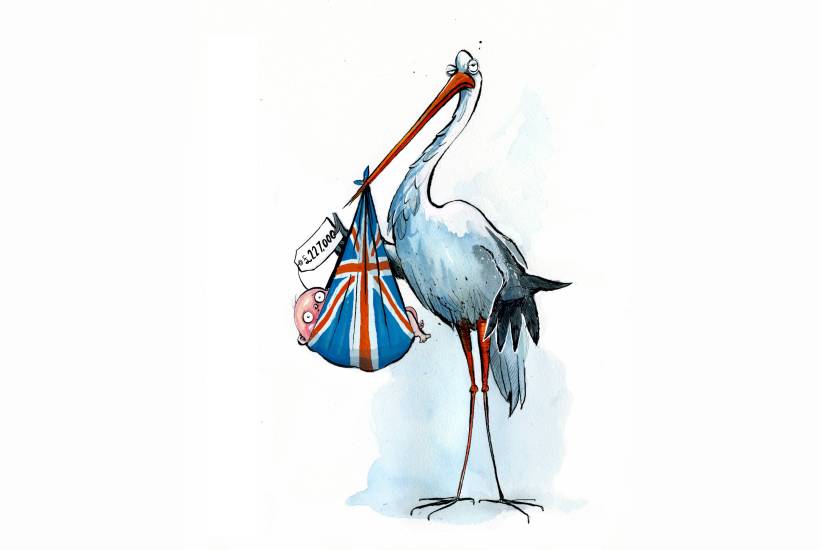Just over five years ago, I wrote an article here about sex and gender and the issues raised by policies and practices allowing people to self-identify in the gender of their choice. Then, the topic was obscure and marginal to a great many people: my decision to write about it was regarded by many friends and contacts as eccentric and perhaps self-harmingly misjudged.
Today, with the sex/gender debate firmly established on the political agenda, I’ve largely left the conversation. Where once there weren’t enough people in politics paying attention, I sometimes think there are now too many.
Would it really do any harm to ask a surrogate mother to affirm after birth that she wanted to go through with the surrogacy?
I learned a great deal from writing about ‘the trans debate’. I learned more about how power works and how institutions can be captured by people with the skill and determination to advance their political agenda through purely bureaucratic means. And I learned that ‘society’ (and to be clear, what I really mean there is ‘society where it is dominated by men’) really doesn’t like it when women say inconvenient things, even when it should listen to them.
I’m retelling this (self-regarding) history now because some of those women, the ones I started listening to in 2017, are now talking about something else. Another issue where they fear policies and practices could be changed in ways that are detrimental to the interests of women, and changed without full regard to the views and voices of women. The issue is surrogacy, where a woman gives birth to a child that is transferred to the custody of others.
Surrogacy isn’t common, but it is growing. According to work at Kent university, the number of cases rose from about 100 a year in England and Wales at the start of the last decade to about 400 a year by 2020.
Those figures don’t include the (unknown but probably growing) number of British people who go abroad, often to low-income countries, to pay a woman to bear a child for them. Few people have good things to say about such arrangements.
Now, there is a big and complicated philosophical debate about surrogacy. Is it right for one person to persuade or pay another to bear a child for them? Some of my feminist friends from the sex/gender debate feel strongly that it is not: they say surrogacy exploits and degrades women. Others argue that a woman has an absolute right to decide what she does with her body, including bearing a child for other people.
I’m not taking a view on the philosophical aspects of surrogacy here. This article is about policy and law, and the effects they have on the people involved in surrogacy and their rights and standing. Particularly the women who give birth.
It is widely argued that laws across the UK on surrogacy are outdated and inadequate. Indeed, they don’t really provide for surrogacy in many respects, leaving surrogates and intended parents to muddle through, and driving some intended parents overseas.
The official response to this situation has been led by the Law Commission, an independent statutory body that advises parliament on how to ensure legislation is up to date and relevant. It has recently published a big report on surrogacy laws, and suggested ways to overhaul them.
The report, written by very eminent lawyers, follows a long consultation period. That process is reassuring, even if some of the results are not.
The central issue here is about when the child born to a surrogate mother becomes the legal charge of another person or persons.
Under current laws, this requires the intended parents to get a court order transferring custody of the child to them. It generally takes up to six months for the legal transfer of custody to be approved by a court. Until then, it is argued, the child is in a suboptimal legal limbo, often looked after by its intended parents but legally still the child of the surrogate. Some people also say this situation is bad for mothers, who may be keen to see that transfer of custody happen sooner and with more certainty.
The commission’s proposed solution to this apparent problem is a new form of legal agreement, where the surrogate and the intended parents sign up, pre-birth, to a legal ‘pathway’ that will, all else being equal, lead to the child becoming the legal charge of the intended parents at birth.
It is notable that the Law Commission repeatedly insists through all its documentation that its proposed changes are in the best interests of all concerned – children, surrogates, intended parents. But when it comes to amending custody arrangements, the commission does essentially nothing to explain how the change might benefit surrogate mothers – presumably because the effect of its proposals is to tilt the system towards the interests of intended parents and firmly against mothers.
Under the commission’s proposals, the surrogate would have quite limited scope to challenge that automatic transfer of custody. For six weeks after birth, the surrogate could seek to cancel the agreement and keep her child.
In its media release and other material publicising its report, the Commission makes this ability to ‘withdraw consent’ for surrogacy sound simple and empowering, something that would ensure the surrogate mother’s views matter. At one point, the Commission says that any surrogacy arrangement should be based on the ‘ongoing consent’ of the surrogate mother.
But the report itself makes clear that the proposed system would put a fairly high hurdle in the path of any surrogate who wished to keep her newborn child:
‘If the surrogate has not withdrawn her consent before the child’s birth, the intended parents will be the child’s legal parents at birth. The surrogate can withdraw her consent in the six-week period after birth. If she does so, the intended parents remain legal parents, but the surrogate can apply to the court for a parental order recognising her as the child’s legal parent. She has six months from the date of birth to make this application. Again, the court would make a decision as to what is in the interests of the child’s lifelong welfare.’
In effect, the legal default setting would be switched so that as soon as surrogate gives birth, her child is actually someone else’s. And even if the mother wanted to challenge that default setting, she’d have to apply for – and win – a court order. She’d have to begin this whole process within six weeks of birth.
The Commission makes six weeks sound like a fair slice of time, and it originally considered an even shorter period.
But does this proposal take proper account of surrogate mothers, their condition and their interests? Around one in seven women experience some form of post-natal depression. It seems likely that a significant number of surrogate would be suffering during that six week period. They may also be suffering physical harm: birth carries risks. The Birth Trauma Association estimates that around 30,000 women a year experience some form of birth trauma in the UK.
Those six weeks after birth can very easily be a time of trauma and struggle for any new mother, let alone one on a legal and institutional conveyor-belt built to carry her newborn child away from her.
And possibly most importantly of all here, even if a surrogate does seek to stop the transfer of custody, there is no guarantee that such an order would be granted by the courts. These proposals raise the possibility that a court could forcibly transfer custody of a surrogate’s child to others, against that mother’s wishes.
All told, I don’t think it’s unduly pessimistic to ask how meaningful that proposed post-natal right to ‘withdraw consent’ for surrogacy would be in reality.
On the other side of the ledger, remember that argument that most surrogates are actually keen for a swift and certain transfer of custody. The Commission proposals, in this view, would give more surrogate mothers what they want.
Who’s right? What do recently post-partum surrogates want? An obvious way to answer that is to ask them. But this is where the Law Commission’s work becomes more troubling still.
To their credit, the commissioners include in the report discussions of some of the proposals they rejected. One such suggestion was that surrogate mothers be asked after birth if they still wish to proceed with the transfer of custody. You might think that asking a woman for her view would be uncontroversial, but the commissioners reject this proposal in quite striking terms:
‘Some consultees wanted a requirement that the surrogate gives further, affirmative consent after the child is born, rather than giving her the right to withdraw her consent. We felt that such a requirement would not respect the shared intentions of the surrogate and the intended parents. A requirement for further consent after birth also suggests that the surrogate’s consent before conception is not adequate, which does not respect her autonomy. Instead, we think her continuing consent can be inferred from her decision not to withdraw her consent, rather than requiring her to make a further declaration.’
Read that bit in bold again, and remember that we’re talking about a woman’s consent to give away her child.
When my car insurance expired recently, my insurer was required by law to ask me if I wanted to renew the policy or take my business elsewhere – because the law doesn’t allow that company to infer my continuing consent to the annual payment of a few hundred quid. But the Law Commission apparently believes that there are circumstances in which it is not just acceptable but preferable – empowering, even – for the law to infer a woman’s consent, in this case to giving up the custody of her newborn baby. And that the best way to ‘respect the autonomy’ of a woman is by not asking her for her ongoing consent.
Note also that phrase ‘shared intentions of the surrogate and the intended parents’. Are the wishes of those intended parents really a factor in deciding whether a woman gets an explicit say on whether to give away her baby? When I first took out my car insurance policy, the company and I had a ‘shared intention’ for that company to insure my car. But that shared intention, reached last year, doesn’t allow the company to renew my policy and take my money this year without my consent. Yet apparently such a historic arrangement should trump a new mother’s scope to have a say on the custody of her baby.
(I’m drawing comparisons with the purchase of insurance to make my point in a measured and non-inflammatory way. But I’m sure that readers can think of more emotive comparators that show why the concept of inferring a woman’s consent is so worrying.)
On reading this part of the report, I found myself wondering: would it really do any harm to ask a surrogate mother to affirm after birth that she wanted to go through with the surrogacy? Could giving a woman a further say on something so serious really be a bad thing? And how on earth did senior and serious lawyers end up answering ‘yes’ to those questions?
More questions follow. Is it possible that some surrogates have second thoughts after birth, but hesitate to say so because of the institutional, social and financial pressure put on them to go ahead? Would the commission’s proposals increase that pressure, making it even less likely that any such regrets are expressed?
Perhaps we’re talking about a few marginal cases, or simply about hypothetical scenarios. But so what? ‘Well, yes, in a few cases it’s possible that women might have to give away a baby against their wishes, but in most cases things will work well for everyone’ isn’t something a society that regards women as people deserving of respect should tolerate. A doctrine of ‘inferred consent’ – promoted by a leading legal authority, no less – cannot be positive for women’s interests.
This is where the parallels between this issue and the sex/gender debate are most visible. Self-ID policies were often adopted and promoted by officials and experts who earnestly believed those policies were the right thing to do to promote the interests of the people immediately affected. Those policies have largely run aground because that policymaking process did not take adequate account of their impact on women. Self-ID policies were largely driven by desire to serve trans people; women were an afterthought, at best. In the context of surrogacy, the impression given is that intended parents are the priority, with surrogate women far less important.
The other reason self-ID policies foundered is that they did not survive contact with wider public opinion. Something that was self-evidently true to some of those closely involved with the gender issue – people can be any gender they chose, and identity trumps biology – struck many non-expert members of the general public as self-evident nonsense.
My hunch is that much the same will be true of a learned legal suggestion that the best way to respect a woman’s wishes about giving away her child is not to ask her for her consent.
Happily, what happens next is likely to differ from the self-ID process in important ways. Because the Law Commission exists to propose legislation, its suggestions are almost certain to get the full parliamentary scrutiny that was (and still is) often absent from the sex/gender issue. So MPs and peers will be able to analyse the proposals in full before they get close to the statute book. When and if they carry out that analysis, they’ll find a significant number of women (and men) who have views that should be considered.
I don’t claim to have fully developed opinions about the law on surrogacy in either its current or proposed forms. I’m still reading and learning and thinking. But my views aren’t the point of this article. What matters is that, once again, some women are raising concerns about the possibility that laws, policies and practices could change in ways that are harmful to the rights and interests of women. Are those concerns justified? I don’t know. But I do know that the last time something like this happened, the people who make decisions about law and policy didn’t listen enough to those women and their concerns. I hope they listen this time.
Got something to add? Join the discussion and comment below.
Get 10 issues for just $10
Subscribe to The Spectator Australia today for the next 10 magazine issues, plus full online access, for just $10.




















Comments
Don't miss out
Join the conversation with other Spectator Australia readers. Subscribe to leave a comment.
SUBSCRIBEAlready a subscriber? Log in